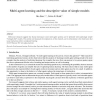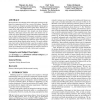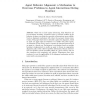462 search results - page 9 / 93 » Modelling Human Intelligence: A Learning Mechanism |
NIPS
1993
13 years 9 months ago
1993
We consider the problem of how the CNS learns to control dynamics of a mechanical system. By using a paradigm where a subject's hand interacts with a virtual mechanical envir...
AI
2007
Springer
13 years 8 months ago
2007
Springer
Behavioral research suggests that human learning in some multi-agent systems can be predicted with surprisingly simple “foresight-free” models. The current note discusses the ...
TSMC
2002
13 years 7 months ago
2002
Imitation is a powerful mechanism whereby knowledge may be transferred between agents (both biological and artificial). Key problems on the topic of imitation have emerged in vario...
ATAL
2008
Springer
13 years 9 months ago
2008
Springer
Recent advances in technology allow multi-agent systems to be deployed in cooperation with or as a service for humans. Typically, those systems are designed assuming individually ...
CIA
2007
Springer
14 years 2 months ago
2007
Springer
When two or more agents interacting, their behaviors are not necessarily matching. Automated ways to overcome con
icts in the behavior of agents can make the execution of interacti...



